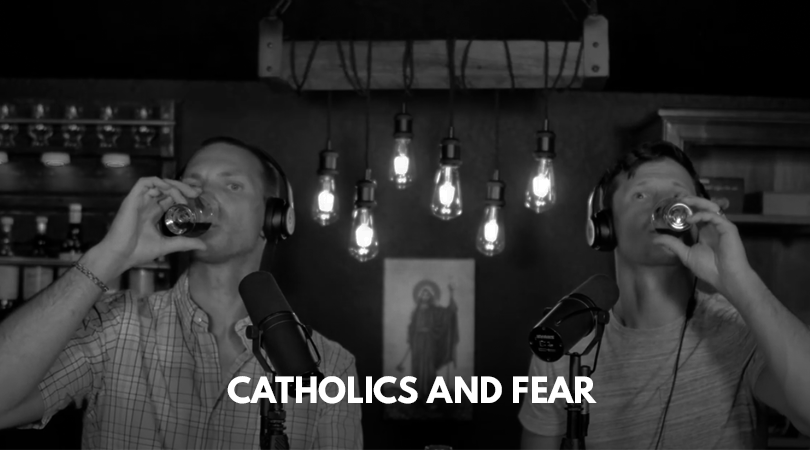
What is Aquinas say about fear?
About our drink:
Basil Hayden’s Dark Rye
https://www.basilhaydens.com/dark-rye?utm_source=google&utm_medium=ppc&utm_campaign=int_dark-rye_exact&utm_term=basil%20hayden%20dark%20rye&utm_id=google_2062759129_75873194803_363742656376_kwd-468596494294_c
Blending is an art form, and our Dark Rye is your chance to own what might very well be a masterpiece.
It all begins with Kentucky Rye, providing a firm foundation of spice, oak, dried fruit and subtle molasses undertones for this release to build upon. From there, Canadian Rye from our award-winning Alberta Distillery is skillfully layered in. A touch of California Port, and its complementary notes of ripe fruit, provides the third and final layer to a whiskey just as at home on the rocks as it is in a cocktail.
Full in flavor, yet delicately nuanced, you’d be wise to grab a bottle of our Dark Rye to experience this magical blend for yourself.
About our gear:
Shotlock for shotguns. Learn more about it here.
Our topic:
WHETHER THE OBJECT OF FEAR IS GOOD OR EVIL?[1]
Fear is a movement of the appetitive power. Now it belongs to the appetitive power to pursue and to avoid, as stated in Ethic. vi. 2: and pursuit is of good, while avoidance is of evil. Consequently whatever movement of the appetitive power implies pursuit, has some good for its object: and whatever movement implies avoidance, has an evil for its object. Wherefore, since fear implies an avoidance, in the first place and of its very nature it regards evil as its proper object.
It can, however, regard good also, in so far as referable to evil. This can be in two ways. In one way, inasmuch as an evil causes privation of good. Now a thing is evil from the very fact that it is a privation of some good. Wherefore, since evil is shunned because it is evil, it follows that it is shunned because it deprives one of the good that one pursues through love thereof. And in this sense Augustine says that there is no cause for fear, save loss of the good we love.
In another way, good stands related to evil as its cause: in so far as some good can by its power bring harm to the good we love: and so, just as hope, as stated above (Q. XL., A. 7), regards two things, namely, the good to which it tends, and the thing through which there is a hope of obtaining the desired good; so also does fear regard two things, namely, the evil from which it shrinks, and that good which, by its power, can inflict that evil. In this way God is feared by man, inasmuch as He can inflict punishment, spiritual or corporal. In this way, too, we fear the power of man; especially when it has been thwarted, or when it is unjust, because then it is more likely to do us a harm.
In like manner one fears to be over another, i.e., to lean on another, so that it is in his power to do us a harm: thus a man fears another, who knows him to be guilty of a crime, lest he reveal it to others.[2]
WHETHER THE EVIL OF SIN IS AN OBJECT OF FEAR?[3]
I answer that, As stated above (Q. XL., A. 1; Q. XLI., A. 2), as the object of hope is a future good difficult but possible to obtain, so the object of fear is a future evil, arduous and not to be easily avoided. From this we may gather that whatever is entirely subject to our power and will, is not an object of fear; and that nothing gives rise to fear save what is due to an external cause. Now human will is the proper cause of the evil of sin: and consequently evil of sin, properly speaking, is not an object of fear.
But since the human will may be inclined to sin by an extrinsic cause; if this cause have a strong power of inclination, in that respect a man may fear the evil of sin, in so far as it arises from that extrinsic cause: as when he fears to dwell in the company of wicked men, lest he be led by them to sin. But, properly speaking, a man thus disposed, fears the being led astray rather than the sin considered in its proper nature, i.e., as a voluntary act; for considered in this light it is not an object of fear to him.[4]
WHETHER FEAR ITSELF CAN BE FEARED?[5]
As stated above (A. 3), nothing can be an object of fear, save what is due to an extrinsic cause; but not that which ensues from our own will. Now fear partly arises from an extrinsic cause, and is partly subject to the will. It is due to an extrinsic cause, in so far as it is a passion resulting from the imagination of an imminent evil. In this sense it is possible for fear to be the object of fear, i.e., a man may fear lest he should be threatened by the necessity of fearing, through being assailed by some great evil.—It is subject to the will, in so far as the lower appetite obeys reason; wherefore man is able to drive fear away. In this sense fear cannot be the object of fear, as Augustine says (QQ. LXXXIII., qu. 33). Lest, however, anyone make use of his arguments, in order to prove that fear cannot at all be the object of fear, we must add a solution to the same.[6]
WHETHER SUDDEN THINGS ARE ESPECIALLY FEARED?[7]
As stated about (A. 3; Q. XLI., A. 2), the object of fear is an imminent evil, which can be repelled, but with difficulty. Now this is due to one of two causes: to the greatness of the evil, or to the weakness of him that fears; while unwontedness and suddenness conduce to both of these causes. First, it helps an imminent evil to seem greater. Because all material things, whether good or evil, the more we consider them, the smaller they seem. Consequently, just as sorrow for a present evil is mitigated in course of time, as Cicero states (De Quæst. Tusc. iii. 30); so, too, fear of a future evil is diminished by thinking about it beforehand.—Secondly, unwontedness and suddenness increase the weakness of him that fears, in so far as they deprive him of the remedies with which he might otherwise provide himself to forestall the coming evil, were it not for the evil taking him by surprise.[8]
WHETHER THOSE THINGS ARE MORE FEARED, FOR WHICH THERE IS NO REMEDY?[9]
The object of fear is evil: consequently whatever tends to increase evil, conduces to the increase of fear. Now evil is increased not only in its species of evil, but also in respect of circumstances, as stated above (Q. XVIII., A. 3). And of all the circumstances, long-lastingness, or even everlastingness, seems to have the greatest bearing on the increase of evil. Because things that exist in time are measured, in a way, according to the duration of time: wherefore if it be an evil to suffer something for a certain length of time, we should reckon the evil doubled, if it be suffered for twice that length of time. And, accordingly, to suffer the same thing for an infinite length of time, i.e., for ever, implies, so to speak, an infinite increase. Now those evils which, after they have come, cannot be remedied at all, or at least not easily, are considered as lasting for ever or for a long time: for which reason they inspire the greatest fear.[10]
WHETHER LOVE IS THE CAUSE OF FEAR?[11]
The objects of the soul’s passions stand in relation thereto as the forms to things natural or artificial: because the passions of the soul take their species from their objects, as the aforesaid things do from their forms. Therefore, just as whatever is a cause of the form, is a cause of the thing constituted by that form, so whatever is a cause, in any way whatever, of the object, is a cause of the passion. Now a thing may be a cause of the object, either by way of efficient cause, or by way of material disposition. Thus the object of pleasure is good apprehended as suitable and conjoined: and its efficient cause is that which causes the conjunction, or the suitableness, or goodness, or apprehension of that good thing; while its cause by way of material disposition, is a habit or any sort of disposition by reason of which this conjoined good becomes suitable or is apprehended as such.
Accordingly, as to the matter in question, the object of fear is something reckoned as an evil to come, near at hand and difficult to avoid. Therefore that which can inflict such an evil, is the efficient cause of the object of fear, and, consequently, of fear itself. While that which renders a man so disposed that thing is such an evil to him, is a cause of fear and of its object, by way of material disposition. And thus it is that love causes fear: since it is through his loving a certain good, that whatever deprives a man of that good is an evil to him, and that consequently he fears it as an evil.[12]
WHETHER DEFECT IS THE CAUSE OF FEAR?[13]
As stated above (A. 1), fear may be set down to a twofold cause: one is by way of a material disposition, on the part of him that fears; the other is by way of efficient cause, on the part of the person feared. As to the first then, some defect is, of itself, the cause of fear: for it is owing to some lack of power that one is unable easily to repulse a threatening evil. And yet, in order to cause fear, this defect must be according to a measure. For the defect which causes fear of a future evil, is less than the defect caused by evil present, which is the object of sorrow. And still greater would be the defect, if perception of the evil, or love of the good whose contrary is feared, were entirely absent.
But as to the second, power and strength are, of themselves, the cause of fear: because it is owing to the fact that the cause apprehended as harmful is powerful, that its effect cannot be repulsed. It may happen, however, in this respect, that some defect causes fear accidentally, in so far as owing to some defect someone wishes to hurt another; for instance, by reason of injustice, either because that other has already done him a harm, or because he fears to be harmed by him.[14]
WHETHER FEAR MAKES ONE SUITABLE FOR COUNSEL?[15]
A man of counsel may be taken in two ways. First, from his being willing or anxious to take counsel. And thus fear makes men of counsel. Because, as the Philosopher says (Ethic. iii. 3), we take counsel on great matters, because therein we distrust ourselves. Now things which make us afraid, are not simply evil, but have a certain magnitude, both because they seem difficult to repel, and because they are apprehended as near to us, as stated above (Q. XLII., A. 2). Wherefore men seek for counsel especially when they are afraid.
Secondly, a man of counsel means one who is apt for giving good counsel: and in this sense, neither fear nor any passion makes men of counsel. Because when a man is affected by a passion, things seem to him greater or smaller than they really are: thus to a lover, what he loves seems better; to him that fears, what he fears seems more dreadful. Consequently owing to the want of right judgment, every passion, considered in itself, hinders the faculty of giving good counsel.[16]
WHETHER FEAR HINDERS ACTION?[17]
Man’s exterior actions are caused by the soul as first mover, but by the bodily members as instruments. Now action may be hindered both by defect of the instrument, and by defect of the principal mover. On the part of the bodily instruments, fear, considered in itself, is always apt to hinder exterior action, on account of the outward members being deprived, through fear, of their heat. But on the part of the soul, if the fear be moderate, without much disturbance of the reason, it conduces to working well, in so far as it causes a certain solicitude, and makes a man take counsel and work with greater attention.—If, however, fear increases so much as to disturb the reason, it hinders action even on the part of the soul. But of such a fear the Apostle does not speak.[18]
WHETHER FEAR IS A SIN?
I answer that, A human act is said to be a sin on account of its being inordinate, because the good of a human act consists in order, as stated above (Q. CIX., A. 2: Q. CXIV., A. 1). Now this due order requires that the appetite be subject to the ruling of reason. And reason dictates that certain things should be shunned and some sought after. Among things to be shunned, it dictates that some are to be shunned more than others; and among things to be sought after, that some are to be sought after more than others. Moreover, the more a good is to be sought after, the more is the opposite evil to be shunned. The result is that reason dictates that certain goods are to be sought after more than certain evils are to be avoided. Accordingly when the appetite shuns what the reason dictates that we should endure rather than forfeit others that we should rather seek for, fear is inordinate and sinful. On the other hand, when the appetite fears so as to shun what reason requires to be shunned, the appetite is neither inordinate nor sinful.[19]
WHETHER FEAR IS A MORTAL SIN?[20]
I answer that, As stated above (A. 1), fear is a sin through being inordinate, that is to say, through shunning what ought not to be shunned according to reason. Now sometimes this inordinateness of fear is confined to the sensitive appetites, without the accession of the rational appetite’s consent: and then it cannot be a mortal, but only a venial sin. But sometimes this inordinateness of fear reaches to the rational appetite which is called the will, which deliberately shuns something against the dictate of reason: and this inordinateness of fear is sometimes a mortal, sometimes a venial sin. For if a man through fear of the danger of death or of any other temporal evil is so disposed as to do what is forbidden, or to omit what is commanded by the Divine law, such fear is a mortal sin: otherwise it is a venial sin.[21]




Comments (0)
To leave or reply to comments, please download free Podbean or
No Comments
To leave or reply to comments,
please download free Podbean App.